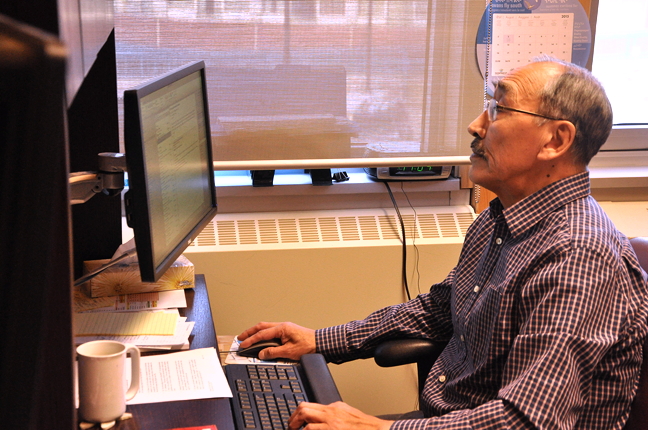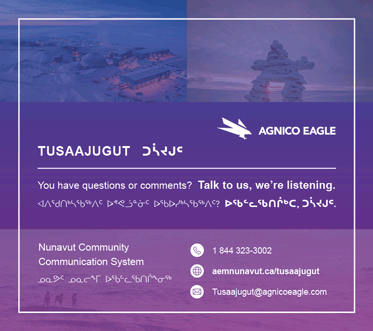Inuktitut will be protected in schools, Nunavut education minister says
“We will always respect and abide by the Inuit Languages Protection Act”

Education Minister Paul Quassa said despite recommendations from a special committee reviewing the education act, which seemed to suggest a greater emphasis should be placed English language instruction, Nunavut schools will always remain bilingual for both English and Inuktitut. (PHOTO BY THOMAS ROHNER)
The Nunavut government sees an education system where both the Inuktitut and English languages are on equal footing, and where Inuit societal values are incorporated into the curriculum.
That’s according to Education Minister Paul Quassa who responded Nov. 23 to concerns raised recently by the territory’s languages commissioner about proposed changes to the territory’s education act.
A special committee of MLAs tabled a report Nov. 5 in the legislative assembly that contained those proposed changes based on the submission of more than 30 stakeholders.
Sandra Inutiq, the languages commissioner, whose office is responsible for overseeing the implementation of the Official Languages Act and the Inuit Language Protection Act, said in a Nov. 16 release that the report is “seemingly regressive in protecting and revitalizing Inuktitut.”
But Quassa, in a Nov. 23 interview from his second-floor office in the same building as the legislature, disagreed.
“We will always respect and abide by the Inuit Language Protection Act. Our schools will always be bilingual,” Quassa said.
Nunavut’s Education Act came into force in 2008, and includes a provision to review the act every five years.
A highly-critical report by the Auditor General of Canada, issued in 2013, said the education department would not meet its goal of being fully bilingual by 2019-20.
For Inutiq, the special committee’s recommendations seem to abandon on that goal altogether.
That’s because the committee’s report brought into question the central right enshrined in the language protection act: the right for Inuit to have access to Inuit language instruction, Inutiq said Nov. 16.
“Not at all,” Quassa said in response to Inutiq’s suggestion.
“Certainly the Inuktitut language will be alive and well within our schools,” he said.
Quassa said Nunavut’s language laws and the Nunavut Land Claims Agreement are safeguards against cultural and language erosion.
“Why did we negotiate our land claims? To ensure that Inuit culture and language is alive and well in all government systems, education or otherwise. That’s what the NLCA was all about,” Quassa said.
Quassa said he’s always supported a standardized education curriculum across Nunavut, which includes a standardized language of instruction, so that any student moving from one community to another inside the territory can pick up where she left off.
Currently, local district education authorities can choose from three different models of language instruction, depending on the make-up of their community.
But because Nunavut is trying to prepare its students for employment inside and outside Nunavut, it makes sense to have some subjects taught in English rather than Inuktitut, Quassa said.
“We can’t just look at Nunavut’s boundaries for our future bilingual graduates. The world isn’t just Nunavut; it’s Canada and beyond,” the minister said.
However, Inutiq said in her release that the MLAs’ recommendations for changing the Education Act suggest academic studies are mutually exclusive with teaching students Inuit culture and language.
And that is a colonial idea that demeans Inuit culture and languages, Inutiq said.
“I don’t think that was the reasoning,” Quassa said, disagreeing again. “There was no intent to think of it that way.”
Quassa added that he hopes Nunavut can follow in the footsteps of Greenland’s education system, which is fully bilingual — from primary to post-secondary levels of education.
The special legislative committee reviewing the Education Act also recommended getting rid of “specific references to the incorporation of Inuit Qaujimajatuqangit” in the current act and teaching IQ as a subject instead.
The thinking behind that, said Quassa, who sat on the committee, is to stop paying mere lip-service to IQ and to incorporate IQ into the curriculum in a way that students can better grasp.
The current Education Act mentions incorporating IQ more than 30 times, but scarcely provides concrete ways of doing that, the minister added.
“I think it’s much better if we put [IQ] into the curriculum rather than have a teacher from the South walk into a classroom, saying [to the students], ‘whatever you do has to reflect IQ’,” Quassa said.
Quassa’s department, which received the special committee’s recommendations on Nov. 2, has until Jan. 2 to respond.
Those responses will be presented during a legislative standing committee hearing scheduled to get underway in Iqaluit on Jan. 20.
An updated education act is expected by the end of this government’s term, which expires in late 2017.





(0) Comments